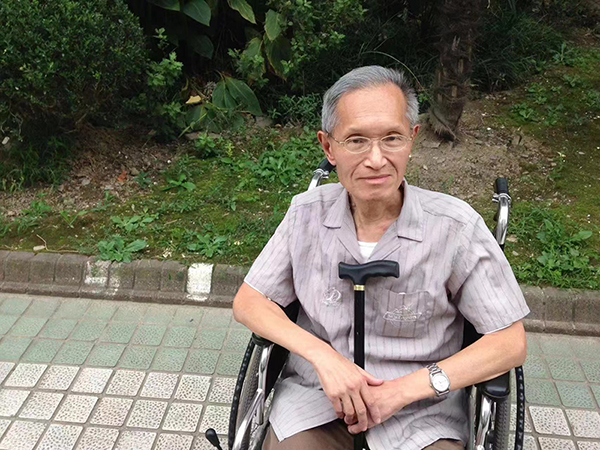Xu Wenkan (1943-2023)
« previous post | next post »

(source)
Xú Wénkān 徐文堪, who was born in October of 1943 in the metropolis of Shanghai, died in the same city on January 4, 2023 of complications arising from the novel coronavirus. He was one of the leading lexicographers compiling and editing the Hànyǔ Dà Cídiǎn 漢語大詞典 (Unabridged Dictionary of Sinitic), a comprehensive work of 23,000 head characters, 370,000 words, and 1,500,000 citations in 12 large volumes plus index, in the editing of which Wenkan played a key role from its beginning in 1977 to its completion in 1994.
I was deeply grieved to hear of Wenkan's passing, but I had a presentiment of it the day he died. He was one my best Chinese friends and scholarly colleagues.
Wenkan was the son of Xu Senyu 徐森玉 (1881-1971), the noted collector, connoisseur, and scholar of Chinese art, a founder of the Shanghai Museum.
Wenkan graduated from East China Normal University 华东师范大学 in 1965.
From the biography by John Tang (see the bibliography below):
From his teenage years, Xu Wenkan showed deep interest in ancient Chinese ethnohistory. In 1960, Xu started his college education in the Department of History at East China Normal University (ECNU). Among the scholars in the department, Professor Li Jigu of Japanese and Eurasian studies, influenced him the most. Xu began to concentrate his studies on Indo-European linguistics, especially on Tocharian by reading works by Holger PEDERSEN, Sylvain LEVY, and WANG Jingru, etc.
After graduation, Xu Wenkan taught for a long time in a middle school. The "Cultural Revolution" (1966-1976) deprived him of the right scholarly activities such as reading academic materials.
From 1992-93, Wenkan was a visiting scholar at the University of Pennsylvania.
He was a member of many academic bodies in China and was famed for helping people revise their papers and translations. From the first time we began to correspond with each other in the late seventies and early eighties, before China was fully open, he constantly amazed me by his masterful bibliographical control. He often knew about publications, lectures, workshops, and conferences before they came out, were held, or were delivered, even many of my own publications and lectures. I can only ascribe this extraordinary talent to dedicated assiduousness and a virtually magical língtōng 灵通 (ability to keep informed).
For decades, countless were the letters that flew back and forth across the Pacific Ocean between us. Mind you, this was in the days before the internet, so we either had to type or handwrite our communications. When computers and the internet did come, Wenkan shunned them because he was concerned that they would lead to character amnesia, so for many years he preferred to use fax when that became available.
Eventually, with the help of his son, Wenkan did learn how to write simple Chinese texts on a computer or a cell phone, but he almost never did so. Instead, he would write everything out by hand. If he needed to submit a manuscript somewhere, he could always hire a typist who would do it for him. When he sent me messages, he always wrote them out longhand (and a very beautiful, exacting hand it was) on a piece of paper. At first, he would fax the messages to me, but then he scanned them as a pdf and attached them to an e-mail that had just these words:
Please to read the attachment.
Wenkan
I used to see Wenkan every time I passed through Shanghai, at least once or twice a year, but then the coronavirus struck. Alas, I never saw my dear friend Wenkan alive again after that, but his image and his intelligence will always be vivid in my heart-mind.
Selected readings
- "The sound and sense of Tocharian" (5/4/20)
- Xu, Wenkan. "The Discovery of the Xinjiang Mummies and Studies of the Origin of the Tocharians". The Journal of Indo-European Studies, 23.3-4 (Fall/Winter, 1995), 357–369.
- Xu, Wenkan. "The Tokharians and Buddhism". In Studies in Central and East Asian Religions, 9 (1996), 1–17.
- Xu, Wenkan. "Beyond Deciphering: An Overview of Tocharian Studies over the Past Thirty Years". In Great Journeys across the Pamir Mountains. Leiden: Brill, 128–139.
- Wei, Lanhai, Hui Li, and Wenkan Xu. "The separate origins of the Tocharians and the Yuezhi: Results from recent advances in archaeology and genetics". In: M. Malzahn, Michaël Peyrot, Hannes Fellner, and Theresa-Susanna Illés, eds. Tocharian Texts in Context: International Conference on Tocharian Manuscripts and Silk Road Culture, June 25-29th, 2013. Bremen: Hempen Verlag, 2015. Pp. 277-300.
The origin of the Tocharians and their relationship to the Yuezhi (月氏) have been debated for more than a century, since the discovery of the Tocharian language. This debate has led to progress on both the scope and depth of our knowledge about the origin of the Indo-European language family and of the Indo-Europeans. Archaeological evidence supporting these theories, however, has until now sadly been lacking. - XU Wenkan. "Guanyu Tuhuoluoren de Qiyuan he Qianxi Wenti [On the Problem of the Origins and Migrations of the Tocharians]". Sino-Platonic Paper, 53 (November, 1994), 1-11.
- A Brief Biography of Professor XU Wenkan.
Tang, John. Journal of Sino – Western Communications; Fremont Vol. 5, Iss. 1, (Jul 2013): 1-4.
[Thanks to Rostislav Berezkin, Qianheng Jiang and Xu Yanxin]
Tye Power said,
January 22, 2023 @ 10:54 pm
Condolences on the loss of your friend. Your warm remembrance of him honors his memory.